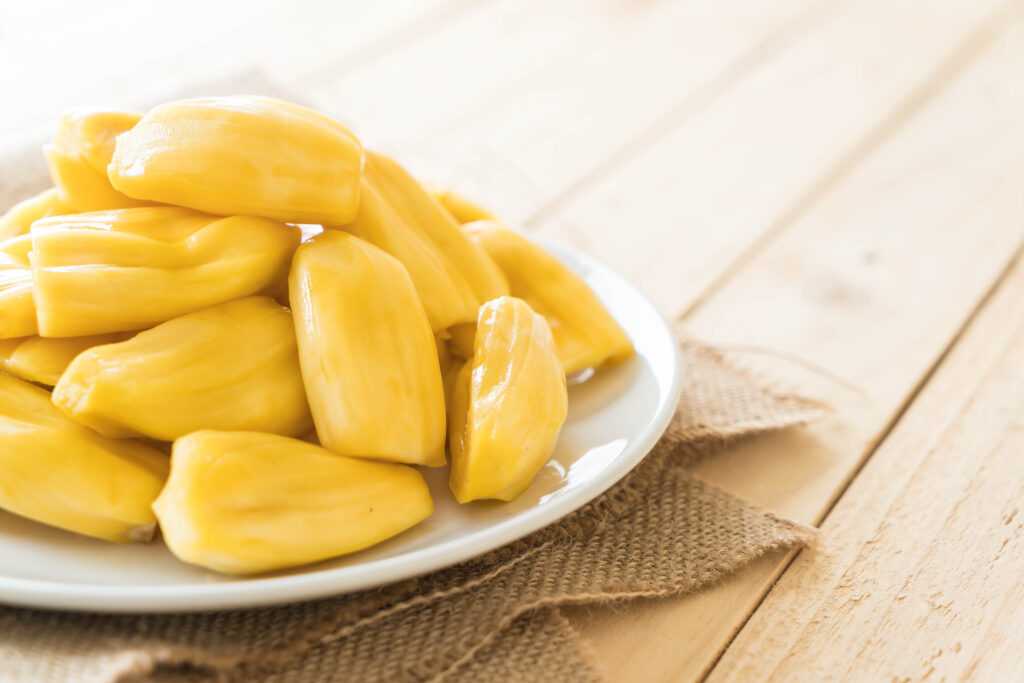
[ad_1]
Jackfruit is a tropical yellowish-brown fruit with hexagonal apices on its exterior. Its sweet and fruity flavor makes it an attraction among all age groups. Jackfruit can be readily incorporated into your diet by eating it simply or in various ways. Jackfruit is also called vegetable meat as it is used as a meat substitute by vegetarians and vegans. Fresh jackfruit is easier to find during the summers, although canned jackfruit is available year-round in grocery shops. Various parts of the jackfruit tree, like fruit, bark, wood, seeds, and meat, are used in traditional medicine for their antimicrobial, antigenic, antifungal, antioxidant, and other properties. Furthermore, this blog will take you through the Jackfruit benefits, uses, and side effects.
Origin of Jackfruit –
Jackfruit is native to the Western Ghats of India. Artocarpus heterophyllus (scientific name of jackfruit) is extensively grown and consumed in Southeast Asian countries of India, Bangladesh, Malaysia, Sri Lanka, Thailand, Philippines, etc., Africa, and South America. This largest tree-borne fruit in the world is seen as a miracle food in South and Southeast Asia. This is because it has the potential to save millions of people from poverty if major staple crops such as wheat, corn, and rice are threatened by climate change. That is why it is called the “poor man’s fruit.”
Jackfruit Nutrients –
Jackfruit has immense nutritional value. Every 100 gm of jackfruit contains:
| Energy | 95 kcal | |
| Macronutrients | Carbohydrates | 23.2 g |
| Proteins | 1.72 g | |
| Fats | 1.5 g | |
| Dietary Fiber | 1.5 g | |
| Vitamin B2 | 0. 055 mg | |
| Vitamin B3 | 0.92mg | |
| Vitamin B6 | 0.329 mg | |
| Vitamin C | 13.7 mg | |
| Micronutrients: Minerals | Potassium | 448 mg |
| Magnesium | 29 mg | |
| Calcium | 24 mg | |
| Phosphorus | 21 mg | |
| Sodium | 2 mg | |
| Manganese | 0.043 mg | |
| Iron | 0.23 mg | |
| Zinc | 0.13 mg | |
| Copper | 0.076 mg | |
| Folate | 24 μg |
Jackfruit Properties –
Jackfruit is no less than a superfood due to the presence of macronutrients, vitamins, minerals, and phytochemicals. The following are some of the properties of jackfruit:
- Anti-inflammatory
- Antimicrobial
- Antifungal
- Wound healing
- Anti-ulcer
- Anti-aging
- Anti-asthmatic
- Antidiarrheal
- Antipyretic
- Anticancer
- Antihypertensive
- Induces sleep
- Anti-anthelmintic
Potential Jackfruit Health Benefits –
Jackfruit is a good antimicrobial, anti-ulcer, anti-aging, antifungal, and anti-inflammatory agent. As a result, jackfruit benefits the human body in ways unimaginable. Let’s look into some of the benefits of jackfruit.
Anaemia is a result of iron deficiency. When iron levels fall, it becomes more difficult to create enough hemoglobin, which transports oxygen to the body’s cells. Essential vitamins like vitamins A, C, and E and minerals like magnesium, manganese, and copper present in jackfruit are essential for the production of blood. As per research, jackfruit benefits in treating anemia.
Jackfruits boost bone density and decrease calcium loss, making existing bones less prone to issues. Daily consumption of jackfruit protects bones against deterioration. The jackfruit also contains minerals such as copper, manganese, phosphorus, and zinc, which benefit bone health. As a result, it alleviates arthritis, osteoporosis, and other bone disorders.
According to research, jackfruit has beta-carotene, which gets transformed into Vitamin A. Vitamin A promotes eye health and is necessary for eyesight as it aids in the normal functioning of the cornea and conjunctival membranes. Nutrients like lutein, zeaxanthin, and carotenoids aid in the filtering of damaging light and the protection of healthy cells in the retina. These nutrients cannot be synthesized by the body but are present in jackfruit.
- Regulates Blood Pressure & Reduces Risk of Cardiovascular Diseases:
According to research, jackfruits enhance heart health due to their high fiber, vitamin B6, potassium, and antioxidant content. Potassium helps mitigate the detrimental effects of sodium levels, preventing arterial damage. This lowers cholesterol levels in the body. Resveratrol is another important compound present in jackfruit that offers circulatory support. This makes jackfruit an essential fruit for regulating blood pressure and the treatment of cardiovascular disorders like ischemia and atherosclerosis.
Jackfruit Benefits include lowering the risk of diabetes as it includes chemicals that lower blood sugar levels. Clinical trials have indicated that jackfruit extracts increase glucose tolerance in diabetic patients.
- Jackfruit leaves can be used to treat diabetes and stabilize blood sugar levels. In-vivo studies have revealed that chemical compounds in jackfruit leaves reduce diabetic complications in patients.
- Furthermore, jackfruit seeds are high in dietary fiber and have a low glycemic index. Jackfruit reduces the incidence of diabetes as a meal with a low glycemic index will not cause a surge in your blood sugar levels.
Jackfruit has a variety of useful ingredients, including flavonoids, antioxidants, saponins, and tannins. These chemicals help cancer treatment by removing free radicals, combating oxidative stress, and preventing tumor cell development. Moreover, research shows that jackfruit seed flour contains anti-cancer properties.
According to research, jackfruit promotes digestion. Because of their high levels of soluble and insoluble fibers, jackfruits have health benefits that aid digestion. Fibers also aid in constipation prevention by bulking up stools. Its ability to absorb water may help decrease cholesterol absorption and fat formation in the digestive system.
When asthma is caused by pollution, jackfruit controls these symptoms by removing free radicals formed in the body, which would otherwise contribute to asthmatic episodes. Therefore, jackfruit aids in the regulation of body imbalances, which results in the control of asthmatic attacks.
- Ensures Healthy Thyroid Functioning:
Jackfruit is high in copper, which aids thyroid metabolism. Jackfruit ensures healthy thyroid functioning and helps people with thyroid issues. It maintains the production and absorption of the thyroid hormone, ensuring a healthy and fit thyroid.
Also, Read The ultimate guide to Dried Cranberries: Benefits, Uses, and Side Effects.
Potential uses of Jackfruit for overall health –
The uses of jackfruit are diversified. It affects almost every system in the human body. Some of the uses of jackfruit are listed below:
Jackfruit is packed in vitamin C and antioxidants, which help to enhance your immune system and strengthen it when fighting an infection. Jackfruit increases the development and functioning of certain white blood cells. Several in-vitro and in-vivo studies have indicated that neutrophils attack the invading germs and viruses, while lymphocytes kill the infected cells.
Jackfruit includes skin-friendly vitamins such as vitamin A and C, which aids in the faster healing of wounds. These vitamins prevent collagen breakdown, repair UV damage to the skin and keep the skin young. Jackfruit is suitable for pregnant women as it assists the mother and child’s health.
Free radicals are formed in our bodies due to severe oxidative stress induced by pollution. Jackfruit is rich in antioxidants, which kill free radicals and slow down the aging process.
- Improves Blood Quality:
Jackfruit contains significant quantities of iron, Vitamin C, magnesium, and copper. These nutrients improve blood quality, aids in preventing illnesses such as anemia, and improve metabolism.
Jackfruit seeds are high in vitamins and minerals, which help to keep your scalp healthy. Soak the seeds overnight, then grind them with water in the morning. Apply this paste to your scalp and leave it on for an hour before rinsing it.
Jackfruit is high in carbohydrates and immediately boosts energy. The sugars in jackfruit are incredibly easy to digest and extremely beneficial to our bodies.
Jackfruit is high in nutrients and low in calories. Research shows that jackfruit seeds have poor water and fat absorption capacity, which aids in the prevention of obesity. People who consume jackfruit feel fuller for longer periods and experience less hunger.
Also, Read Ice Apple (Nungu): Nutrition, Health Benefits, and Dietary Tips.
Jackfruit Side Effects –
Although jackfruit is generally harmless, certain people may need to limit or avoid it.
- Avoid jackfruits if you notice any unwanted side effects.
- Certain people are allergic to jackfruit, particularly those allergic to birch pollen.
- Due to jackfruit’s ability to lower blood sugar levels, diabetic patients may need to adjust their medication dosages if they consume jackfruit regularly.
Conclusion –
Jackfruit is an extremely important food for the smooth and proper functioning of the body. Unfortunately, very few people are unaware of the fruit’s uses and health benefits. Over the years, people have become distant from such nutritional foods. But it’s never too late! Incorporate jackfruit into your diet in curries, gravies, hummus, and soups. Whatever taste and form you prefer is the best!
FAQs
What are the health benefits of jackfruit?
Jackfruit has enormous health benefits. It improves vision, regulates blood pressure & reduces the risk of cardiovascular diseases, prevents diabetes, cures anemia, ensures healthy functioning of the thyroid gland, induces sleep, improves immunity, enhances skin health, averts aging, aids digestion, and prevents cancer, among others.
What are the side effects of jackfruit?
Jackfruit is generally harmless. However, certain people are allergic to it, particularly those allergic to birch pollen. Due to jackfruit’s ability to lower blood sugar levels, diabetic patients may need to adjust their medication dosages if they consume jackfruit regularly.
What are the nutritional benefits of jackfruit?
Jackfruit is a storehouse of carbohydrates, proteins, fats, fructose, sucrose, and dietary fibers. It is rich in vitamin c, potassium, magnesium, calcium, phosphorus, and sodium. It also contains vitamin B2, vitamin B3, vitamin B6, manganese, iron, zinc, copper, and folate in trace amounts.
[ad_2]
Source link





No comment yet, add your voice below!